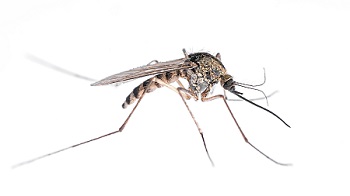Football season (and spring) is upon us and for many people this means gathering with friends outdoors to tailgate and grill burgers and hotdogs while watching the big games. Mosquitoes can quickly put a damper on outdoor activities and there is no simple solution for combating this perennial summer pest. Where do they come from? Even though we are still in drought conditions, we have had enough afternoon showers to favor mosquito development. Mosquitoes need quiet, non-flowing water for their development to take place. Mosquitoes can lay their eggs on the surface of water in anything that will collect and hold water such as; birdbaths, water pans under container plants, children’s toys in the yard, roof gutters and the list goes on… Some types of mosquitoes can lay their eggs at the base of vegetation bordering streams or in low-lying moist areas subject to flooding.
Mosquitoes develop rapidly, transforming into biting adults in as little as one week. A neglected birdbath or wheelbarrow allowed to accumulate water can produce hundreds of new mosquitoes each day.
What can be done about them? Eliminate Breeding Sites. The best way to control mosquitoes is to find and eliminate their breeding sites. Eliminating large areas of standing water such as swamps or ditches may require a community wide effort. Nonetheless, homeowners can take steps to prevent mosquitoes from breeding on their property.
-
Dispose of anything that can collect and hold water. Do not allow water to accumulate at the base of flower pots or in pet dishes for more than a few days. Clean debris from rain gutters and remove any standing water on patios or flat roofs.
-
Change water in bird baths and wading pools at least once a week. Consider stocking ornamental ponds with predacious minnows. Known as mosquito fish, these minnows are about 1-1 ½ inches in length and can be purchased or seined from streams and creeks. Another approach with ornamental ponds is to apply a “biorational” insecticide which prevents mosquitoes from developing in the water. Products containing methoprene or Bacillus thuringiensis varisraeliensis (Mosquito dunks, Bactimos) are essentially harmless to other aquatic organisms and easily found in your local garden centers.
-
Check around faucets and air conditioner units and repair leaks or puddles that remain for several days. Eliminate seepage from cisterns, septic tanks, and animal watering troughs.
-
Fill or drain puddles, ditches and swampy areas. Remove, drain or fill tree holes and stumps with a suitable sealant.
-
Irrigate lawns and gardens carefully to prevent water from standing for several days.
Mosquitoes can be kept out of homes by securely screening windows, doors and porches. The occasional mosquito found indoors can be eliminated with a fly swatter or aerosol-type insecticide labeled for flying insects.
Topically-Applied Repellents will help prevent bites when spending time outdoors. Use mosquito repellents containing ingredients such as diethyl toluamide (DEET). In general, the higher the percentage of DEET in the ingredients, the longer the protection. Low-percentage formulations are available for use with young children. Non-DEET containing repellents (e.g Avon Skin-so-soft, citronella) may provide some relief, but to a lesser degree and for a shorter duration. It is often desirable to apply insect repellent on outer clothing as well as the skin. Always read and follow directions on the container. Mosquito repellent should not be applied to the hands of young children, and treated skin should be washed with soap and water.
Remember, pesticides are poisonous. Read and follow directions and safety precautions on labels. Handle carefully and store in original labeled containers out of the reach of children, pets, and livestock. Dispose of empty containers right away, in a safe manner and place and do not contaminate forage, streams, or ponds.
![]()
 Part of the Alabama Cooperative Extension Service (ACES)
Part of the Alabama Cooperative Extension Service (ACES)
